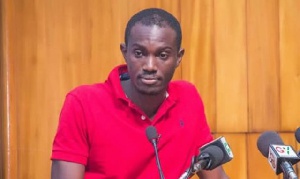A group calling itself The Economic Fighters League (Fighters) led by Ernesto Yeboah has described the 1992 Constitution as a fraud perpetrated on the people of Ghana, MyNewsGh.com has filed.
According to Mr Ernesto, “that document” sums the problems of Ghana as it has created a system where the same constitution that “pretends” to safeguard human rights serves as a shield for those who have abused the law.
Ernesto Yeboah said this in a speech at an end-of-year gathering of the group on Saturday, 26 January 2019.
Mr Enersto Yeboah described the 1992 constitution as “an undemocratic document meant to empower a few individuals without addressing the critical issues facing the masses.”
Labelling the constitution as “a sakawa constitution”, he said it was “fueling an unequal society”. He questioned the existence of Indemnity Clauses in the constitution and expressed anger about Article 71 Office Holders.
He called on all Ghanaians to question the provisions in the Constitution and have it quashed for a better document, which will ensure equality and justice.
“Our biggest impediment to economic freedom in our lifetime starts and ends with our Constitution, the 1992 Constitution,” he said.
He cited the indemnity clause in the Constitution as one major provision that is opposed to modern democracy.
“It is not lawful for any court or tribunal to entertain any action or take any decision or make any order or grant any remedy or relief in any proceedings instituted against the Government of Ghana or any person acting under the authority of the Government of Ghana whether before or after the coming into force of this Constitution or against any person or persons acting in concert or individually to assist or bring about the change in Government which took place on the twenty-fourth day of February 1966 on the thirteenth day of January 1972, on the fourth day of June 1979 and on the thirty-first day of December 1981 in respect of any act or omission relating to, or consequent upon
(a) the overthrow of the government in power before the formation of the National Liberation Council, the National Redemption Council, the Supreme Military Council, the Armed Forces Revolutionary Council and the Provisional National Defence Council; or
(b) the suspension or abrogation of the Constitutions of 1960, 1969 and 1979; or
(c) the establishment of the National Liberation Council, the National Redemption Council, the
Supreme Military Council which took office on the ninth day of October 1975, the Supreme Military Council established on the fifth day of July 1978, the Armed Forces Revolutionary Council, or the Provisional National Defence Council; or
(d) the establishment of this Constitution”.
“Which truly democratic state in the world has a constitution that puts some citizens over and above the laws of a country?” he asked.
“Unfortunately, this is not a constitution that brings about what it purports. This is a ‘sakawa constitution’. It is a constitution that has failed to bring about economic freedom. It is a constitution that fails to carry the morality to be able to evoke an equal and just society”.
He said equality before the law is a key cardinal of any truly democratic state. However, Mr Ernesto noted, certain clauses in the constitution makes some citizens untouchable and, so, “those citizens who lost their property, those citizens who lost their fundamental human rights … many people have suffered injustices and painful memories, yet the 1992 Constitution is telling us that anybody who seeks justice from any of those who conducted such injustice on them, no court, no tribunal, no centre, no institution shall entertain that”.
In his view, those officers “separate themselves from the national payroll and elevate themselves to the point where they are not to partake in the single spine salary structure that they have fashioned out for the ordinary Ghanaians. When it comes to them, they are separate. What kind of constitution is that?” he queried.
Mr Yeboah also raised issued concerning the entrusting of the resources of the country into the hands of the President. For him, the citizens are the ones who should have control and make an input in relation to the use of the resources.
“Take the issue of our resources and its control. Any democracy that takes away power from the people to decide on the use of their resources and hands it over to a few such as what we have in the 1992 Constitution where only the President, the President alone, can wake up one morning and say that: ‘All the bauxite that we have in this country should be given to my brother’, that tells you that this constitution is not the people’s constitution”.
General News of Monday, 28 January 2019
Source: mynewsgh.com













